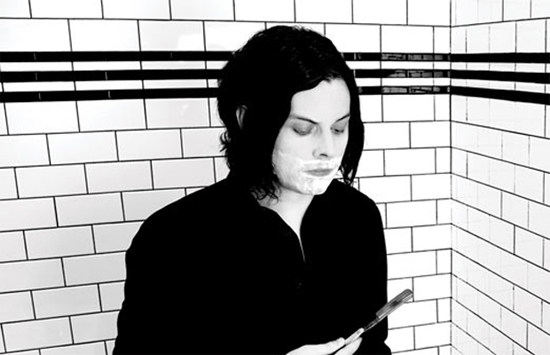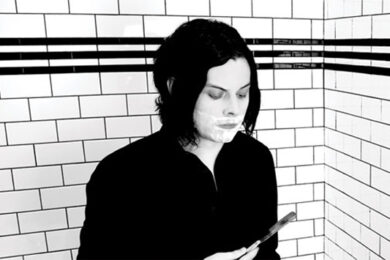The playback for Jack White’s debut solo album, Blunderbuss, has taken a rather surreal turn. As if holding it in the Debating Chamber of London County Hall wasn’t weird enough – the members of the press and other attendees resemble a ramshackle version of the Roman senate – Jack White is being interviewed afterwards by the Mayor of Lambeth, Christiana Valcarcel. Resplendent in her official finery, she makes no secret of her admiration for the former White Stripe.
"You are a genius, man, you are a talent," she gushes before adding, "Don’t get big-headed, though, but you should be proud of yourself."
Almost blushing, White replies, "Should I not be big-headed, or should I be proud of myself? I can’t do both!"
Blunderbuss sees White emerging from the cover of his various musical projects to release a collection of songs under his own name. A strangely hesitant album, it finds White almost relinquishing his role of guitar-hero-for-a-generation to that of someone using the studio as an instrument. Maybe that’s down to the album’s gestation. Created in the studio – often with no material prepared in advance – the sessions weren’t planned for anything in particular until the process was further down the line.
"I didn’t really know I was doing it until I was doing it; four or five songs in, it felt like it was turning in to something," he explains. "That’s how it started, I got three songs out of the first session, and it just sorta kept going. I didn’t know if they’d be for a Dead Weather record or a Raconteurs record, but by about the sixth or seventh song it felt like I was making a record of its own, so I just thought ‘I guess I’ll call this Me’."
Discussing the recording and writing process, White said: "Sometimes I would challenge myself, when I had nothing, to make something up on the spot, although I’d tell the other players that I already had something in mind. I would just sit down at the piano, while six or seven people were standing around, waiting for me to tell them what to do. I’d make up the changes and the tempo as I went along."
While the album’s development may have deviated from Jack White’s usual M.O., the playback itself sees the traditionalism that the musician prides himself on. Earlier, a huge screen comes to life with the camera fixed on a turntable. White appears on screen to put on – what else? – the vinyl edition of the album. The needle hits the record and we’re off…
Side 1
=========
‘Missing Pieces’
The electric piano intro – a regular fixture on the 70s music scene and a classic rock staple – is much in evidence here, as it finds itself underpinned by the kind of beefy drums that suggest that Jack might have listening to some hip-hop amongst the indigenous musical joys of Nashville. Indeed, Jack’s trademark fret-worrying doesn’t come in to play until the latter part of the song when it stutters and struts almost as special guest in its own song. Lyrically, Jack’s body seems to be falling apart. In the first verse, his nose is bleeding but thanks to him standing in a shower, he fails to notice his predicament until he looks in the mirror. As anyone who’s spent the previous night in the chisel will attest, it’s impossible not to notice such a thing – especially when you eat your own bogies to get an early morning buzz.
‘Sixteen Salteens’
Our hero is back on more familiar territory as his guitar is dusted from its case, plugged in through a series of effects pedals and allowed to let rip. This is Jack White in full schizo mode, as he channels the air-raid siren wailing of Robert Plant and the finger-blurring skills of Jimmy Page. The end result is the kind of rocker that will satisfy fans of Jack’s shredding skills.
‘Freedom At 21’
Jack White’s almost casual ability to riff on a guitar is brought to the fore on this track. His dexterity with six strings and a fretboard is here enhanced by the sort of shuffling, echoed drums that recall John Bonham’s tubthumping career high in the cavernous hallway of Hedley Grange. Just as the ears think they may have a handle of where this mid-paced track is headed, a huge slab of feedback comes crashing in, like the police during a dawn raid, to shake you out of your complacency.
‘Love Interruption’
A marked shift down in gear, as the electric piano dominates as track that also contains the soothing strums of an acoustic guitar. A heartache song by any measure, the music belies the rage at the heart of the protagonist’s pain as he rages, "I want love to murder my own mother." It’s a weird juxtaposition, not least because this is the moment a lava lamp should be switched on, skins reached for and a towel placed under the front door.
‘Blunderbuss’
Acoustic and slide guitars coalesce with a strolling piano and waltzing drums. Once the fiddles come in over the top, there’s no doubt left in the mind that Jack’s time in Nashville has left an indelible mark on him. Speaking after the album playback, White admits, "If I didn’t live in Nashville, I don’t think I would have ended up making this record, because the other element of it is that I’ve been producing 45s by other people for my record label Third Man for the last three years. Through all those 45s I’ve done, I’ve collected a humungous family of people – pedal steel players, violinists, harpists, everything there is in town."
‘Hypocritical Kiss’
The shuffling waltz time of the drums is still very much the order of the day, as an arpeggiated piano leads from the front. It’s round about here that the absence of any shredding starts to become apparent, as does the realisation that this album is likely to have more in common with Get Behind Me, Satan than any of his other releases. Heartbreak rears its head once more, but Jack isn’t telling whether this is autobiographical or not. "’Hypocritical Kiss’ was just an interesting narration," he explains after the playback. "When you’re a songwriter you get to choose who narrates the tale – first person, third person, male or female. Sometimes you can confuse the listener, and that’s what I wanted to do in that song."
‘Weep Themselves To Sleep’
After the dominance of the piano comes the return of some rocking guitar and, er… some piano. Still, at least they slug it out for pole position throughout, as a
scratchy lead break finally gives way to some rolling keyboards. It’s almost as if Jack has been listening to a bit of Chopin on the sly…
At this point, the record on the screen is turned over by Jack White. There’s a huge blob of dust on the vinyl that becomes almost hypnotic as it goes around and around and around. For a brief moment, the thought occurs that Jack may be have to lift the needle if it hit the dust, but somehow disaster is averted and the playback continues uninterrupted…
Side 2
=========
‘I’m Shaking’
The funky riffing that fuels this track arrives in stark contrast to the piano-led songs that preceded it on the other side of the record. Bolstered by some truly soulful backing vocals, this slice of Southern boogie really does swing.
‘Trash Tongue Talker’
And Jack’s back at the ol’ Joanna again as he lashes out at what appears to be a woman with stalking tendencies. The fat drums that are unleashed here offer a very funky flavour and the addition of further percussion ensures this track swings like a pendulum. All in all, ‘Trash Tongue Talker’ mines a real bar room groove that evokes an after hours atmosphere.
‘Hip (Eponymous) Poor Boy’
The influence of Nashville is felt keenly once again on this country ballad. An acoustic guitar is accompanied by piano as the narrator laments his sorry state.
‘I Guess I Should Go To Sleep’
Such is the smoky feel of this waltz time number that it’s almost verging on jazz. Once again we find ourselves in heartbreak territory, as the newly-single subject of the song finds him or herself adjusting to their new status. If Tom Waits was partial to a dab or two he might sound a bit like this.
‘On And On And On’
Probably the most ethereal track on the album, this droning, waltzing country tune possesses a delightfully dreamy quality. Jack’s use of delicate guitar tremolo adds to the hypnotic feel of the song.
‘Take Me With You When You Go’
Not enough waltzing piano songs for you? Here’s another hoedown with added fiddles and a fleeting glimpse of marimba. This could almost be Dave Brubeck in a plaid shirt and cowboy boots. But hold on – here comes some big, fat guitar as of to remind you of what it is that Jack White is famous for: he pushes, he pulls and – praise the Lord! – he squalls.



